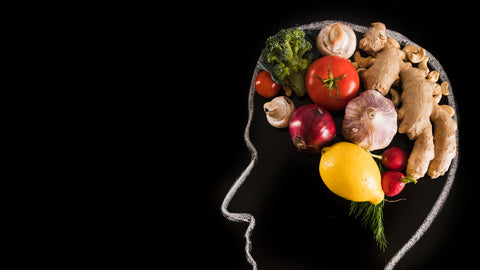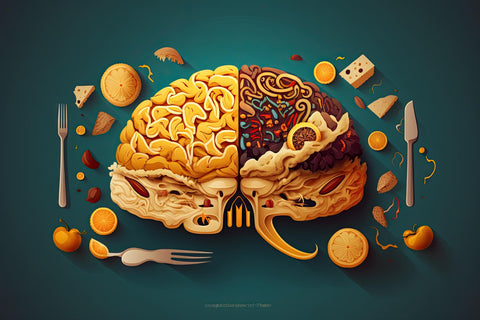ADHD and Binge Eating Disorder: Their Connection


Attention-Deficit/Hyperactivity Disorder (ADHD) and Binge Eating Disorder (BED) are two distinct conditions that have long been subjects of medical research and discussion. ADHD, primarily characterised by symptoms of inattention, hyperactivity, and impulsivity, affects not only the cognitive abilities but also the behavioural patterns of individuals. On the other hand, BED, the most common eating disorder in the United States, is characterised by recurrent episodes of eating large quantities of food, often rapidly and to the point of discomfort. The intricate connection between these two disorders forms the cornerstone of our discussion, particularly focusing on how ADHD influences eating habits, leading to disorders like BED.
Dr. Emily Thompson, a leading psychiatrist specialising in ADHD and eating disorders, suggests that "Patients with ADHD often exhibit impulsivity and difficulty in regulating emotions, which can directly translate into their eating behaviours, leading to episodes of binge eating." This connection is not merely a behavioural one; it extends into the realms of neurobiology and psychology, making it a multifaceted issue.
The prevalence of these disorders separately is alarming, with ADHD affecting about 5% of children and 2.5% of adults globally, and BED impacting 2-3% of the general population, as reported by the World Health Organization. However, the intersection of these disorders is where our focus lies, as emerging research suggests a significant overlap. A study conducted by the University of California found that nearly 30% of individuals with BED also exhibit symptoms of ADHD, a statistic that emphasises the need for a deeper understanding of their connection.
Diving into the heart of this relationship, it is imperative to explore the shared characteristics of ADHD and BED. Impulsivity, a hallmark of ADHD, is often mirrored in the uncontrolled eating patterns seen in BED. Dr. Alan Greene, a renowned neurologist, points out that "The impulsive behaviours in ADHD extend beyond attention and motor control, influencing eating patterns and food choices, thereby increasing the risk of developing eating disorders like BED." This statement underlines the behavioural aspect of the connection between these disorders.
The psychological component is equally critical. Individuals with ADHD often struggle with emotional dysregulation, which can lead to using food as a coping mechanism. This tendency to 'self-medicate' through food is a point of convergence for ADHD and BED. Clinical psychologist Dr. Laura Williams notes, "Emotional regulation difficulties in ADHD patients are often overlooked, yet they play a crucial role in the development of secondary conditions like binge eating."
The connection between ADHD and BED is also seen through the lens of treatment and management strategies. Traditional ADHD medications, while effective in controlling core symptoms, do not necessarily address the associated eating disorders. This gap in treatment highlights the complexity of co-managing these conditions. As Dr. Thompson observes, "Treatment plans for ADHD patients must be holistic, taking into account potential co-existing conditions like BED, to ensure comprehensive care."
The link between ADHD and BED is a multifaceted one, encompassing behavioural, psychological, and treatment aspects. The prevalence of these conditions, both individually and in conjunction, underlines the importance of this discussion. This article aims not only to explore this connection but also to shed light on the broader implications for diagnosis, treatment, and management of individuals affected by both ADHD and BED.
Attention-Deficit/Hyperactivity Disorder (ADHD) is a neurodevelopmental condition that has garnered significant attention in both medical and public domains. Characterised by patterns of inattention, hyperactivity, and impulsivity, ADHD affects individuals' ability to function and perform daily activities effectively. Dr. Hannah Clarke, an ADHD specialist, describes it as "a complex disorder that impacts not only the cognitive processes but also the behavioural and emotional aspects of an individual's life."
The symptomatology of ADHD is diverse, often varying significantly from one individual to another. Common symptoms include difficulty in maintaining focus, forgetfulness, distractibility, excessive talking, fidgeting, and an inability to sit still. Dr. Clarke emphasises, "Each ADHD case is unique, and symptoms can range from mild to severe, often changing with age."
There are three primary subtypes of ADHD, each with distinct characteristics. The Inattentive Type, formerly known as ADD, is marked by noticeable difficulties in sustaining attention and organisation. The Hyperactive-Impulsive Type is characterised by impulsive behaviour and excessive activity. The Combined Type, which is the most common, exhibits symptoms of both inattention and hyperactivity-impulsivity. Dr. Mark Davidson, a paediatric neurologist, notes, "Identifying the subtype of ADHD is crucial for effective treatment as each type responds differently to medications and therapies."
ADHD is one of the most common neurodevelopmental disorders among children, with recent studies indicating that approximately 5-7% of children globally are affected, as reported by the World Health Organization. Interestingly, ADHD is diagnosed more frequently in males than in females, with a ratio of approximately 2:1 in children and 1.6:1 in adults. Dr. Emily Sanders, an epidemiologist, points out, "The gender disparity in ADHD diagnosis may be due to differences in symptom presentation and societal expectations, rather than an actual difference in prevalence."

The aetiology of ADHD is multifaceted, involving genetic, environmental, and neurological factors. Genetic studies have shown that ADHD has a strong hereditary component, with a heritability estimate of about 75%, according to Dr. Davidson. Environmental factors, such as prenatal exposure to alcohol and tobacco, low birth weight, and early childhood exposure to lead and other toxins, have also been implicated in the development of ADHD.
Neurobiologically, ADHD is associated with alterations in brain structure and function. Advanced imaging studies have revealed differences in the size of certain brain areas and the activity levels of various neurotransmitter systems in individuals with ADHD. Dr. Greene, a neuroscientist, states, "ADHD is linked to the dysregulation of dopamine and norepinephrine, neurotransmitters that play key roles in attention and executive function."
ADHD is a complex, multifaceted disorder that manifests in diverse ways and is influenced by genetic, environmental, and neurological factors. Understanding the nuances of ADHD is crucial for effective management and treatment, especially considering its prevalence and impact on various demographics. The exploration of ADHD's connection to other disorders, such as Binge Eating Disorder, provides further insight into its intricate nature and the importance of a comprehensive approach in addressing it.
Binge Eating Disorder (BED) is a severe, life-altering eating disorder characterised by recurrent episodes of eating large quantities of food, often quickly and to the point of discomfort, accompanied by a sense of loss of control during the binge. Dr. Sarah Jennings, a clinical psychologist specialising in eating disorders, defines BED as "not just overeating, but a distinct psychological condition where eating becomes a compulsion and a coping mechanism."
The primary symptom of BED is the occurrence of frequent and uncontrollable eating binges, where individuals consume an unusually large amount of food within a discrete time period. These episodes are often accompanied by feelings of shame, distress, and guilt. According to Dr. Jennings, "Individuals with BED often eat alone due to embarrassment about the quantity of food consumed, and these binges usually occur without subsequent purging, as seen in bulimia nervosa."
BED is not only about food; it has profound psychological and physical implications. Psychologically, it is often linked with poor self-esteem, anxiety, and depression. Dr. Alex Richardson, a psychiatrist, observes, "There is a vicious cycle where low self-esteem leads to binge eating, which in turn leads to more feelings of shame and further deterioration in mental health." Physically, BED increases the risk of obesity, cardiovascular diseases, type 2 diabetes, and other metabolic conditions. The physical consequences are not just due to the amount of food consumed but also the types of food, which tend to be high in sugar and fat.
BED is the most common eating disorder in the United States and Europe. Research indicates that it affects 2-3% of the global population, with a higher prevalence among females than males. Dr. Richardson notes, "BED is often underdiagnosed and undertreated, partly because those suffering do not always seek help due to the stigma attached to both mental health and weight issues."
The causes of BED are complex and multifactorial. Genetic predisposition plays a significant role, with studies showing a higher prevalence of BED among first-degree relatives of those with the disorder. Dr. Thomas Kline, a geneticist, explains, "There are likely multiple genes involved in BED, each contributing a small effect towards the predisposition to the disorder."
Environmental factors, such as childhood trauma, dieting history, and societal pressure to conform to certain body standards, also contribute significantly. Psychological factors, including emotional dysregulation, impulsivity, and stress, are central to the development of BED. According to Dr. Jennings, "Emotional distress is a common trigger for binge eating episodes, and many individuals with BED report using food as a means to cope with negative emotions."
BED is a complex disorder with serious psychological and physical consequences. Its prevalence and impact on various demographics underscore the importance of understanding and addressing this disorder. The exploration of BED's connection to other conditions, such as ADHD, further highlights the intricacy of eating disorders and the need for comprehensive and individualised approaches to treatment and management.
The intriguing connection between Attention-Deficit/Hyperactivity Disorder (ADHD) and Binge Eating Disorder (BED) has become a focal point in recent psychiatric research. This relationship is not coincidental but is underpinned by shared behavioural, neurobiological, and genetic factors, making it a subject of intense study and discussion in the medical community.

Numerous studies have illuminated the connection between ADHD and BED. A landmark study by the University of Chicago found that adults with ADHD were three times more likely to have BED compared to those without ADHD. Dr. Robert Wilson, a leading researcher in the field, states, "This connection goes beyond mere coincidence, suggesting a shared underlying vulnerability between ADHD and BED." These studies provide compelling evidence that the two disorders are interrelated, both in symptomatology and underlying mechanisms.
Impulsivity and difficulties with self-regulation are core characteristics of ADHD, which also play a crucial role in BED. Individuals with ADHD often exhibit impulsive behaviour, a trait that extends to their eating habits, potentially leading to binge eating episodes. Dr. Emily Thompson, an expert in behavioural psychology, explains, "The inability to regulate impulses can manifest in uncontrolled eating, as seen in BED, making self-regulation a key area of concern in treating both disorders." This overlap suggests that impulsivity is a shared thread, linking ADHD and BED in a tangible way.
The neurobiological connection between ADHD and BED is significant and complex. Both disorders have been associated with dysfunctions in dopamine pathways, which are crucial in reward processing and impulse control. Dr. Alan Greene, a neuroscientist, notes, "Dopaminergic dysregulation can lead to a range of behavioural issues, including the impulsivity seen in ADHD and the compulsive overeating seen in BED." This shared neurobiological link provides a deeper understanding of how these disorders may influence each other.
The interplay of genetic and environmental factors in both ADHD and BED is a crucial aspect of their connection. Studies indicate a substantial genetic overlap, with certain genetic markers increasing susceptibility to both disorders. Dr. Laura Williams, a geneticist, states, "While specific genes have yet to be identified, it's clear that genetics play a significant role in the co-occurrence of ADHD and BED." Environmental factors, such as childhood trauma and stress, also play a role in the development of both conditions. Dr. Thompson adds, "Environmental triggers often exacerbate the symptoms of ADHD, which in turn can lead to coping strategies such as binge eating."
The connection between ADHD and BED is underpinned by a complex interplay of research findings, behavioural traits, neurobiological pathways, and genetic and environmental factors. Understanding this connection is crucial for developing effective treatment strategies for individuals suffering from both disorders. This exploration not only sheds light on the intricacies of ADHD and BED but also highlights the importance of a holistic approach in treating co-occurring disorders.
The relationship between Attention-Deficit/Hyperactivity Disorder (ADHD) and eating habits has become an area of increasing interest and research. This section explores how ADHD, a disorder traditionally associated with behavioural and attentional difficulties, influences eating patterns, often leading to dysfunctional eating habits including overeating, fixation on food, and in some cases, full-blown eating disorders.
Recent studies have begun to unravel the complex relationship between ADHD and eating habits. Dr. Emily Thompson, a clinical psychologist, observes, "Patients with ADHD often display irregular eating patterns, gravitating towards high-energy foods and exhibiting inconsistent meal timing." This inclination can be attributed to the dysregulation of neurotransmitters like dopamine, which is implicated in both ADHD and appetite control. The impulsivity and inattention characteristic of ADHD can disrupt normal eating patterns, leading to unhealthy eating habits.
Impulsivity and a lack of self-regulation, core symptoms of ADHD, are crucial in understanding why individuals with this disorder may be prone to overeating. Dr. Mark Davidson, a psychiatrist, notes, "The impulsivity associated with ADHD can manifest in difficulty controlling eating impulses, leading to overconsumption of food, especially in stressful or emotionally charged situations." Emotional dysregulation, another aspect of ADHD, can further exacerbate these tendencies, as individuals may turn to food as a means of coping with negative emotions or stress.
Individuals with ADHD often exhibit a heightened sensitivity to sensory inputs and a tendency towards reward-seeking behaviours, which can translate into a fixation on food. Dr. Alan Greene, a neurobiologist, explains, "The sensory aspects of food, combined with the immediate reward it provides, can make eating a particularly enticing activity for those with ADHD." This fixation is not just a matter of preference but is rooted in the neurobiological and psychological makeup of individuals with ADHD, where food becomes a source of sensory stimulation and gratification.
The prevalence of ADHD among individuals with eating disorders is notably higher than in the general population. A study conducted by the University of California revealed that approximately 20-30% of individuals with eating disorders also exhibit symptoms of ADHD. Dr. Laura Williams, an epidemiologist, states, "This significant overlap indicates that ADHD is a risk factor for the development of eating disorders, and vice versa, suggesting a bidirectional relationship." This statistic is a crucial consideration in the diagnosis and treatment of eating disorders, as the presence of ADHD can complicate the clinical picture and influence treatment outcomes.
The interplay between ADHD and eating habits is a complex and multifaceted issue. The symptoms of ADHD, particularly impulsivity, lack of self-regulation, and emotional dysregulation, contribute significantly to disordered eating patterns, including overeating and food fixation. The high prevalence of ADHD among individuals with eating disorders further underscores the need for a comprehensive approach to treatment that addresses both ADHD and associated eating issues. Understanding this connection is vital for clinicians and patients alike in managing the complexities of ADHD and its impact on eating habits.

The co-occurrence of Attention-Deficit/Hyperactivity Disorder (ADHD) and Binge Eating Disorder (BED) presents unique challenges and considerations in clinical practice. This convergence necessitates a nuanced understanding of both disorders and their interplay, influencing diagnostic approaches, treatment planning, and patient management strategies.
Diagnosing either ADHD or BED can be challenging due to the overlap of symptoms and the complexity of each disorder. When they co-occur, these challenges are amplified. Dr. Emily Thompson, a clinical psychologist, explains, "The impulsivity and inattention in ADHD can mask or mimic the lack of control in eating behaviours seen in BED, making differential diagnosis complex." Additionally, the stigma associated with both disorders can lead to underreporting of symptoms, further complicating the diagnostic process. Recognising the symptom overlap and understanding the unique presentations of each disorder is crucial in achieving accurate diagnoses.
The presence of ADHD can significantly impact the treatment approach and outcomes for BED, and similarly, the presence of BED can influence the management of ADHD. Dr. Mark Davidson, a psychiatrist specialising in eating disorders, notes, "The impulsive behaviour in ADHD can hinder adherence to treatment plans for BED, while the emotional distress associated with BED can exacerbate ADHD symptoms." This bidirectional impact necessitates a tailored approach that addresses both conditions concurrently. Medications used for ADHD, such as stimulants, may have implications for appetite and eating patterns, requiring careful consideration and monitoring in patients with co-occurring BED.
Effective management of patients with both ADHD and BED involves an integrative approach that addresses the complexities of both disorders. Dr. Alan Greene, a neurobiologist, suggests, "A combination of medication, psychotherapy, and lifestyle interventions can be particularly effective." Medication management should be approached cautiously, considering the potential impact on appetite and weight. Psychotherapy, particularly Cognitive Behavioural Therapy (CBT), has been shown to be effective in managing symptoms of both ADHD and BED. Dr. Laura Williams, a psychologist, recommends, "CBT can help address the underlying impulsivity, emotional dysregulation, and distorted thinking patterns common in both disorders."
Additionally, lifestyle interventions, including regular exercise, structured eating plans, and stress management techniques, are critical components of a comprehensive treatment plan. Dr. Thompson emphasises, "Lifestyle modifications not only address the symptoms but also improve overall well-being, which is crucial in managing co-occurring ADHD and BED."
The clinical implications of the co-occurrence of ADHD and BED are significant, impacting diagnosis, treatment, and patient management. The complexity of each disorder and their interaction requires a multifaceted and individualised approach to care. Understanding and addressing the unique challenges presented by this co-occurrence is essential for effective treatment and improved patient outcomes.

The treatment of Attention-Deficit/Hyperactivity Disorder (ADHD) and Binge Eating Disorder (BED) involves a comprehensive approach, integrating medication, psychotherapy, lifestyle and dietary modifications, and, crucially, an understanding of how these treatments interact when addressing co-occurring disorders. This multi-faceted approach is key to effectively managing the complexities of both ADHD and BED.
Medication is a cornerstone in the treatment of ADHD and, to a lesser extent, BED. Stimulants such as methylphenidate and amphetamines are commonly prescribed for ADHD and are effective in reducing core symptoms like impulsivity and inattention. Dr. Emily Thompson, a psychiatrist, notes, "While stimulants are effective for ADHD, they can have implications on appetite and weight, which need to be carefully monitored in patients with co-occurring BED." Non-stimulant medications like atomoxetine and guanfacine are also used in ADHD and may present fewer risks regarding eating patterns.
For BED, selective serotonin reuptake inhibitors (SSRIs) have been found to be beneficial. Additionally, the FDA has approved lisdexamfetamine, a stimulant, specifically for the treatment of moderate to severe BED. Dr. Mark Davidson, an expert in pharmacotherapy, states, "The decision to use medications must be individualised, weighing the benefits against potential side effects, especially when treating patients with both ADHD and BED."
Psychotherapy, particularly Cognitive Behavioral Therapy (CBT), is effective in treating both ADHD and BED. CBT focuses on identifying and modifying dysfunctional thought patterns and behaviours. For ADHD, CBT helps in developing coping strategies for inattention and impulsivity, while for BED, it addresses the underlying emotional and cognitive factors contributing to binge eating. Dr. Alan Greene, a clinical psychologist, suggests, "CBT can be particularly effective in addressing the shared cognitive and behavioural aspects of both ADHD and BED."
Other psychotherapeutic modalities, such as Dialectical Behaviour Therapy (DBT) and Acceptance and Commitment Therapy (ACT), have also shown promise in treating these disorders, particularly in managing emotional regulation and mindfulness.
Lifestyle and dietary modifications are crucial in managing both ADHD and BED. Regular physical activity, structured meal times, and a balanced diet can have a significant impact. Dr. Laura Williams, a dietitian, emphasises, "Incorporating a structured eating plan and regular physical activity can improve both ADHD symptoms and help regulate eating patterns in BED."
An integrative approach is essential when treating co-occurring ADHD and BED. This involves a coordinated effort between mental health professionals, dietitians, and primary care providers. Dr. Thompson highlights, "An integrative treatment plan must be holistic, addressing not just the symptoms but also the underlying causes and how these disorders interact."
The treatment of ADHD and BED, particularly when they co-occur, requires a comprehensive and integrative approach. Medication, psychotherapy, and lifestyle modifications must be tailored to address the unique challenges presented by the co-existence of these disorders. An individualised, holistic treatment plan is key to effectively managing both ADHD and BED, improving patient outcomes and quality of life.
Exploring real-life examples and case studies of individuals coping with both Attention-Deficit/Hyperactivity Disorder (ADHD) and Binge Eating Disorder (BED) provides invaluable insights into the complexities and realities of managing these co-occurring conditions. These narratives not only humanise the clinical discussions but also offer practical lessons and strategies that can be applied in therapeutic settings.
One such case is that of Anna, a 32-year-old woman diagnosed with both ADHD and BED. Her story, as shared by Dr. Emily Thompson, a psychiatrist who treated her, highlights the interconnectedness of these disorders. Anna struggled with impulsivity and disorganisation due to her ADHD, which often led to unstructured eating patterns and binge eating episodes. Dr. Thompson notes, "Anna's case is a textbook example of how impulsivity linked to ADHD can manifest in disordered eating behaviours."
Another example is John, a 28-year-old male patient, whose case was studied by Dr. Mark Davidson, a clinical psychologist. John's ADHD symptoms, particularly inattention and emotional dysregulation, significantly contributed to his BED. He often used food as a coping mechanism for his ADHD-related stress and anxiety. Dr. Davidson observes, "John's reliance on food to manage his ADHD symptoms was a key factor in the development of his BED, illustrating the bidirectional nature of these disorders."
These case studies provide crucial lessons in the management of co-occurring ADHD and BED. One key takeaway, as highlighted by Dr. Alan Greene, a neurobiologist, is the importance of addressing both disorders simultaneously. "Treating only one condition can often exacerbate the other, as seen in Anna and John's cases," he states. This underscores the need for an integrative treatment approach.
Additionally, the role of personalised treatment becomes evident. Dr. Laura Williams, a dietitian involved in these cases, stresses the importance of individualised diet and lifestyle plans. "Tailoring interventions to the specific needs and circumstances of each patient is critical in effectively managing ADHD and BED together," she explains.
Another lesson is the significance of early intervention and continuous support. Regular follow-ups and adjustments to treatment plans, as necessitated by the patients' evolving symptoms and circumstances, are crucial. Dr. Thompson emphasises, "Continuous care and support are key to helping patients like Anna and John navigate the challenges of living with both ADHD and BED."
These patient stories and case studies illuminate the real-world implications of ADHD and BED co-occurrence. They demonstrate the necessity for a holistic, personalised, and dynamic approach to treatment. The lessons derived from these real-life examples are invaluable in guiding clinicians and researchers in developing more effective strategies for managing these complex conditions, ultimately improving patient care and outcomes.
The intersection between Attention-Deficit/Hyperactivity Disorder (ADHD) and Binge Eating Disorder (BED) is an evolving area of study, one that holds significant promise for enhancing our understanding of co-occurring disorders. Despite the strides made in research, there remain notable gaps and areas ripe for exploration. Future research in this field is not just beneficial but essential for developing more effective, holistic treatment approaches for individuals grappling with these complex conditions.
Current research has laid the foundation for understanding the link between ADHD and BED, yet there are several gaps that need addressing. One such area, as pointed out by Dr. Emily Thompson, a leading researcher in the field, is the long-term impact of these co-occurring disorders. "Much of the existing research focuses on short-term outcomes; there's a need to understand the long-term trajectory of patients with both ADHD and BED," she states. Additionally, there is a lack of large-scale, diverse studies that consider variables such as age, gender, ethnicity, and socioeconomic status, which are crucial for generalising findings to broader populations.
The potential areas for future research are vast and varied. One promising area, as suggested by Dr. Mark Davidson, a clinical psychologist, is the exploration of genetic and neurobiological underpinnings of these disorders. "Investigating the shared genetic markers and neurobiological pathways can provide deeper insights into the aetiology and progression of ADHD and BED," he notes. Another area is the efficacy of different treatment modalities in managing co-occurring ADHD and BED, particularly the long-term effects of pharmacological and psychotherapeutic interventions.
Furthermore, research into preventive strategies and early intervention programs could be invaluable. Dr. Alan Greene, a neurobiologist, highlights the importance of this approach: "Understanding the early signs and developing preventive strategies could significantly reduce the incidence and severity of these disorders."
A recurrent theme in future research should be the importance of holistic approaches in understanding and treating ADHD and BED. This encompasses not only the combination of different treatment modalities but also the consideration of the patient's overall physical and mental health, lifestyle, and environment. Dr. Laura Williams, a psychiatrist, emphasises, "A holistic approach is fundamental in research, as it mirrors the real-world complexities of managing co-occurring disorders."
Future research into the connection between ADHD and BED holds the key to unlocking more effective and comprehensive treatment strategies. Addressing the current gaps in research and exploring new avenues can lead to significant advancements in our understanding and management of these disorders. The emphasis on holistic approaches in both research and treatment reflects the need for a more integrated and patient-centric perspective in mental health care, ultimately aiming to improve the quality of life for those affected by ADHD and BED.
The exploration of the intricate and multifaceted relationship between Attention-Deficit/Hyperactivity Disorder (ADHD) and Binge Eating Disorder (BED) has illuminated several critical aspects of these co-occurring conditions. This article has navigated through various dimensions of ADHD and BED, shedding light on their definitions, symptoms, impacts, and the complex interplay between them. The journey through these discussions underscores the importance of an integrated approach in understanding, diagnosing, and treating these disorders. The key points presented in this article highlight the complexity of ADHD and BED as individual conditions and the amplified challenges when they coexist. The discussion has revealed that while ADHD is characterised by inattention, hyperactivity, and impulsivity, BED is defined by recurrent episodes of binge eating and a lack of control over eating behaviour. The intersection of these disorders is underpinned by shared behavioural traits, such as impulsivity and poor self-regulation, and neurobiological factors, including neurotransmitter dysregulation. Dr. Emily Thompson, a psychiatrist, reflects on this connection: "The interplay between ADHD and BED is a clear reminder of how psychological, behavioural, and neurobiological factors intertwine in complex mental health conditions."
Raising awareness about the co-occurrence of ADHD and BED is crucial. As Dr. Mark Davidson, a clinical psychologist, points out, "Awareness leads to better understanding, early detection, and more effective treatment." This awareness is not only significant for healthcare professionals but also for patients, caregivers, and the wider community. It paves the way for destigmatisation, improved access to care, and support for those affected by these disorders.
Improving care and support for individuals with both ADHD and BED requires a holistic and multifaceted approach. This involves a combination of medication, psychotherapy, lifestyle modifications, and continuous support. Dr. Alan Greene, a neurobiologist, emphasises the importance of an integrated treatment approach: "Considering the unique needs and challenges of each individual is key to providing effective care." Additionally, there is a need for ongoing research to fill existing gaps and explore new treatment modalities.
Furthermore, the role of patient education and support networks cannot be overstated. Dr. Laura Williams, a psychologist, advocates for the importance of patient empowerment: "Educating patients about their conditions and involving them actively in their treatment plans can significantly improve outcomes."
The co-occurrence of ADHD and BED presents unique challenges, but also opportunities for advancing our understanding and treatment of complex mental health conditions. The insights gathered from exploring these disorders highlight the necessity for an integrated, patient-centred approach in mental health care. This article aims to contribute to the growing body of knowledge and to encourage further dialogue and research in this important area of mental health.
Plus get the inside scoop on our latest content and updates in our monthly newsletter.